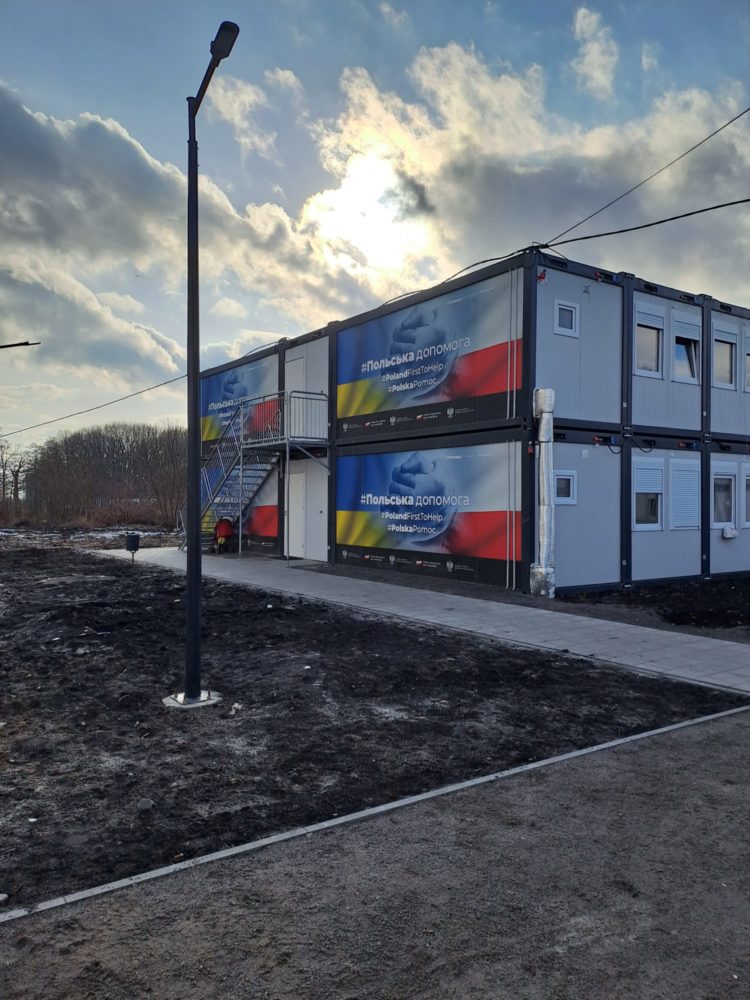Catherine Naughton, the Executive Director of the European Disability Forum visited Poland and Ukraine from the 1 to the 11 March to learn how disability organisations are working to support persons with disabilities affected by the war. She was joined by representatives of CBM International, who are currently funding this support.
The trip included visits to programmes in war-affected areas such as Kyiv, Lviv and Vinnytsa, and projects supporting displaced persons in Warsaw and Zamość.

The visit also included discussions with the government, humanitarian actors, and international organisations (including EU agencies).
Call for a coordinated approach
EDF’s members – the National Assembly of Persons with Disabilities in Ukraine and League of the Strong – lead a call for a coordinated approach to the inclusion of persons with disabilities:
- An approach – by governments and other actors – underpinned by the principles of the UN Convention on the Rights of Persons and the IASC Guidelines on Inclusion of Persons with Disabilities in Humanitarian Action.
- Supporting Ukraine’s path to an inclusive and accessible reconstruction effort.
- Meaningful participation and leadership of persons with disabilities and their representative organisations.
- Increased support of international agencies, disability organisations and humanitarian actors to the Government of Ukraine’s plans for disability inclusion.
- Develop and fund a range of social services that allow people to live independently in the community.
- Ensure funding opportunities that require organisations to collaborate and partner with representative organisations of persons with disabilities.
- Ensure local disability organisations receive direct financial support that is adapted to their needs.
Catherine Naughton, Executive Director of the European Disability Forum, said:
Organisations of Persons with Disabilities have gone above and beyond in supporting people during this war. They must be recognised as real heroes. We need the wider humanitarian community to step up and ensure support reaches all persons with disabilities. We also need governments, the EU and international agencies to support Ukraine in reconstruction to ensure an accessible, inclusive future.
Heimo Duttle, Project Development Consultant Inclusive Humanitarian Action Initiative at CBM, said:
Many times, Persons with Disabilities have no access to international and national support and are left behind. CBM addresses the needs of Persons with Disabilities by supporting Organisations of Persons with Disabilities in Ukraine and neighbouring countries.
Larysa Bayda, Programme Director at the National Assembly of Persons with Disabilities of Ukraine, said:
The support by the European Disability Forum and CMB proved to be timely and essential for Ukrainian organisations of people with disabilities. We managed to continue our work during the war and help thousands of Ukrainians with disabilities. Over this period we have been faced with multiple challenges that still emerge on daily basis and need to be addressed. Therefore, it is highly important today to ensure efficient coordination between humanitarian actors in all disability-related issues.
Daria Sydorenko, Executive Director of the NGO “League of the Strong”, stated:
During the year of the full-scale invasion, almost 16 thousand people with disabilities in Ukraine received help thanks to the joint project and EDF’s support. We managed to unite 11 organizations and create an all-Ukrainian support community. The next step in the cooperation is a large project on the inclusion of human rights in the context of state reconstruction. The project “Rebuild Ukraine. Inclusion” is an opportunity to change approaches and build a truly accessible state. And we are counting on the experience and assistance of international partners,
In Poland, the Polish Disability Forum (PFON) addresses the needs of persons with disabilities. They signalled that persons displaced by the war have special difficulties in finding accessible accommodation, assistive devices, healthcare and need support with administrative processes.
Anna Drabarz, representative of the Polish Disability Forum, said:
The tremendous efforts of Polish organisations of persons with disabilities has made humanitarian aid at least partly accessible to persons with disabilities. We were able to find allies also among organisations that do not specialise in the field of disability and accessibility, but have great experience in actions for migrants. This transfer of knowledge and other resources is a new value for both parties. However, we still lack governmental and local authorities at this table. We require solutions and collaboration in responding to the needs of people with disabilities in extreme situations, not only in this still ongoing crisis but also for the next ones. To develop that, we also need support and solidarity from the international community and other organisations of persons with disabilities from other countries.
Resources
- Photo documentation of the trip (Flickr gallery)
- Report: Rights of persons with disabilities during the war in Ukraine
- Statement: The international community must support persons with disabilities in Ukraine
- Riga Declaration on a Peaceful and Disability-Inclusive Ukraine
Notes to editors
Contact:
André Félix
Communications Coordinator
European Disability Forum
Naima Sheikh
Regional Communication & Brand Coordinator · Asia & America
CBM
The European Disability Forum is an umbrella organisation of persons with disabilities that defends the interests of 100 million Europeans with disabilities. EDF is a unique platform that brings together representative organisations of persons with disabilities across Europe. It is run by persons with disabilities and their families. EDF is a strong, united voice of persons with disabilities in Europe
CBM is one of the leading international organisations for inclusive development. It supports people with disabilities in low- and middle-income countries countries of the world and has been doing so for more than 110 years. Together with its local partners, CBM ensures that their lives are fundamentally and permanently improved. It provides medical aid to those in need and advocates for the equal participation in society of persons with disabilities. Its goal is an inclusive world in which people with and without disabilities can contribute and no one is left behind. Last year, CBM supported 492 projects in 46 countries. More at www.cbm.org.